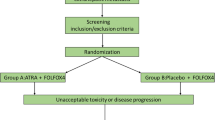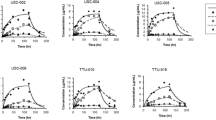Abstract
Twenty-nine chemotherapy-naive patients with primary hepatocellular carcinoma were treated with oral β-all trans-retinoic acid (retinoic acid, TRA 50 mg/m2 tid) on a 3-week on/one week off schedule until progression or grade 3 or 4 toxicity. Eligibility requirements allowed abnormal liver function tests as long as the creatinine and bilirubin levels were normal. No responses were seen and the median survival was four months. Grade 3 side effects occurred in 11 patients and grade 4 in four and included a wide range of toxicities. The results indicate that oral TRA is ineffective against primary hepatocellular carcinoma and suggest that dose-modification of this retinoid may be required in patients with significant malignant hepatic involvement.
Similar content being viewed by others
References
Meyskens FL: Recent advances in the management of cancer with retinoids. Annals of Oncology 5: 529–532, 1994
Warrell RP Jr.: Clinical and molecular aspects of retinoid therapy for acute promyelocytic leukemia. Int J Cancer 70: 496–497, 1997
Garcia M, de The H, Tiollais P, Samarut J, Dejean A: A Hepatitis virus pre-s-retinoic acid receptor beta chimera transforms erythrocytic progenitor cells in vitro. Proceed National Acad Science USA 90: 89–93, 1993
Sever C, Loeker J: Expression of retinoic acid and receptor genes in liver and hepacellular carcinoma. Mol Carcinogenesis 4: 138–144, 1991
Hsu SL, Lin HM, Chou CK: Suppression of the tumorgenicity of human hepatoma hep3B cells by long-term retinoic acid treatment. Cancer Letters 99: 79–85, 1996
Li C, Locker J, Wan YJ: RXR-mediated regulation of the alpha-fetoprotein gene through an upstream element. DNA and Cell Biology 15: 955–963, 1996
Harvey WH, Fleming TR, Goodman PJ, Hawkins JE, Macdonald JS: Phase II study of trimetrexate in previously untreated patients with hepatocellular carcinoma. Invest New Drugs 11: 45–46, 1993
Poplin EA, Tangen CM, Harvey WH, Macdonald JS: Hepatoma/ merbarone: a Southwest Oncology Group Study. Invest New Drugs 12: 337–340, 1994
Muto Y, Moriwake H, Ninomiya A et al.: Prevention of second primary tumors by an acyclic retinoid, polyprenoic acid, in patients with hepatocellular carcinoma. Hepatoma Prevention Study. New Eng of Med 334: 1561–1567, 1996
Nakamura N, Shidoji Y, Yamada Y, Hatakeyama H, Moriwaki H, Muto Y: Induction of apoptosis by acyclic retinoid in the human hepatoma-derive cell line, HuH-7. Biochem and Biophysic Res Comm 207: 382–388, 1995
Author information
Authors and Affiliations
Rights and permissions
About this article
Cite this article
Meyskens, F.L., Jacobson, J., Nguyen, B. et al. Phase II trial of oral β-all trans-retinoic acid in hepatocellular carcinoma (SWOG 9157). Invest New Drugs 16, 171–173 (1998). https://doi.org/10.1023/A:1006032706362
Issue Date:
DOI: https://doi.org/10.1023/A:1006032706362




